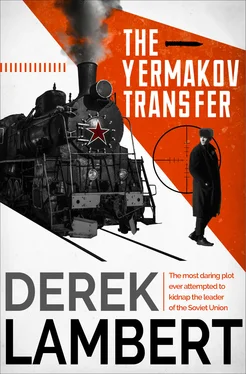His father leaned across the table, prodding the air with his spoon. “Listen, boy, you are a Soviet citizen. You are registered as one. I am a Soviet citizen, too. Forget anything you may know about your ancestors.” He paused. “About your mother even. This is a great country, perhaps the most powerful country in the world. Be proud to belong to it. Don’t sacrifice your life for the sake of the martyrs.”
Looking at his father’s wasted features, Viktor knew that, although he spoke truths, he lied. Subsequently he wondered if the decision to fight for Zionism was made then. Out of perversity, out of contempt – not fully realised at the time – for paternal weakness; out of his own shame.
From the boy he had protected in the playground he learned about Israel. It was once called Palestine and it was populated by people who had come from Egypt thousands of years ago. They read the Bible, worshipped their own God, their land was destroyed by the Romans and they spread all over the world. With them they took their traditions, their Bible, their customs, their diets, their suffering. Throughout history, the boy told his saviour, the Jews had been persecuted and in the holocaust they had been slaughtered by the million by the Nazis.
Viktor envied the boy his birthright; but he couldn’t understand his acceptance of his plight.
Pavlov’s Jewishness continued to bother him in his early teens; but it was still only a needle, not the knife it was to become. There were summer camps and sports and girls to distract him; he was emerging as a scholar with a keen mathematical brain and the school had high hopes for him at university.
It wasn’t till he reached the age when young men seek a cause – when, that is, he became a student – that Viktor Pavlov took the first steps that were to lead him on the path to high treason in the year 1973.
* * *
He was nineteen and sleeping with a passionate Jewish girl, a little older than himself, in the Black Sea resort of Sochi. He was at a Komsomol summer camp, she was staying in one of the town’s 650 sanatoriums. Her passion and expertise gave him much pleasure; but her fervour had a long-term quality to it and he expected trouble if he broke up the affair, from her brother, a wiry young man with a lot of muscle adhering to his prominent bones, the face of a fanatic and a premature bald patch which looked like a skull-cap.
One sleepy afternoon, with the sun throwing shoals of light on to the blue sea, Viktor and the girl, Olga Soliman, walked up the mountain road to Dagomys, the capital of Russian tea, 20 kilometres from Sochi. They drank tea on the porch of a log cabin, ate Kuban pies, then headed for the woods. Their love-making had a heightened lust to it on a bed of pine-needles with the sun casting leopard-spots of warmth on their bodies. Such was the aphrodisiac quality of the open air, the sun, the pinewoods, that Viktor was quicker than usual. But, anticipating him, so was Olga.
She pointed at his sex shrinking inside its little fleshy hood. “I shouldn’t let you touch me with that,” she said. “Why don’t you have it cut off?”
It was a joke and Viktor laughed. But it was also the truth and a part of him hated the joke.
“Too late now,” he said. “Perhaps I should have the whole thing cut off.”
She nuzzled him, biting his ear. Her skirt was around her waist and her big, brown-nippled breasts were still free. She said: “Don’t ever do that. I’ve got a lot of use for that.” In the long years to come, she implied. And yet, Pavlov thought, with the sun dappling his skin, and the smell of her in his nostrils, I love her. Knowing at the same time that he didn’t, not in the absolute, permanent sense. Love was an emotion he could control. He wasn’t so sure about hate.
Arm in arm, they walked down the mountain road to Sochi where, it was claimed, the mineral waters of Matsesta could help patients suffering from heart diseases, neuroses, hypertension, skin diseases and gynaecological disorders. There wasn’t much that Sochi couldn’t alleviate and the brochures asserted that 95 per cent of all those seeking treatment left the resort considerably improved or cured. But Viktor Pavlov wasn’t among them. His disease went back centuries and no one had ever touched upon a cure.
When they arrived at the Kavkazskaya Riviera sanatorium which took Intourist guests and was therefore prestigious, Olga’s brother, Lev, was waiting for them.
He looked at Viktor with fraternal menace. “Had a good time?” Olga’s parents were also staying at the sanatorium and the view was that Viktor Pavlov was already one of the family and should make it legal.
“Pleasant,” Olga said. “But exhausting.” Allowing the implication to sink home before adding: “It was a long walk.” She smiled contentedly – possessively, Viktor Pavlov thought.
They were standing in the lobby of the sanatorium, breathing cool, remedial air.
Lev said: “I have bad news for you.” He held a long mantilla envelope with the words Moscow University on it.
Olga took the envelope. “Why bad news?”
Lev Soliman grimaced. “Is it ever any other?”
They were all three at the University studying different subjects.
“You’re a pessimist,” Olga told her brother.
“I am a realist.”
“To hell with your realism.”
But her fingers shook as she ripped open the envelope with one decadent, pink-varnished fingernail.
She read the letter slowly. Then she began to shiver.
“What is it?” Viktor asked.
“What’s the good news?” her brother asked.
She re-folded the letter, replacing it in the envelope. “I’ve been expelled from the university,” she said.
They were silent for a moment. Then Viktor demanded: “Why?” He paused because he knew the answer. “You were doing well … your examination marks were good.”
Lev Soliman turned on him. “Don’t pretend you don’t know. Don’t be too much of a hypocrite, a half-caste. She has been expelled because she is a Jew.”
* * *
When they returned to Moscow, Viktor Pavlov told Lev Soliman that he thought he should quit university.
They were walking through Gorky Park, filled this late-summer day, with guitar-strumming youths, picknicking families, lovers, union soldiers and sailors. Bands played, rowing boats patrolled the mossy waters of the lake, the ferris wheel took shrieking girls to heaven and back again.
“Why?” Lev asked. “Your guilt again?”
“Perhaps.” They stopped at a stall near a small theatre and bought glasses of fizzy cherry cordial. They were close now, these two, close enough to exchange insults without malice. “I feel like a traitor.”
“Don’t,” Lev Soliman said. “Feel like a hero.”
“What the hell are you talking about?”
“I’ll tell you.” Lev pointed at the ferris wheel. “Let’s take a ride. No one can overhear us up there. Not even the K.G.B.”
The wheel stopped when they were at its zenith and they looked down on Moscow glazed with heat; the gold cupolas of discarded religions, the drowsy river, the fingers of new apartment blocks. Lev Soliman pointed down at the pygmy people in the park. “Good people,” he said. “A great country. Make no mistake about that.”
“I don’t,” Viktor told him. “I was born in Leningrad. Any country that can come back after losing twenty million is a great country. But not so great if you’re a Jew, eh?”
“But you’re not.”
A breeze sighed in the wheel’s struts; the car perched in space, swayed slightly.
Pavlov said: “I am a Jew.”
“That’s not what it says on your papers.”
“You can’t blame me for that. There are thousands of Jews registered as Soviet citizens through mixed marriages.”
Читать дальше












